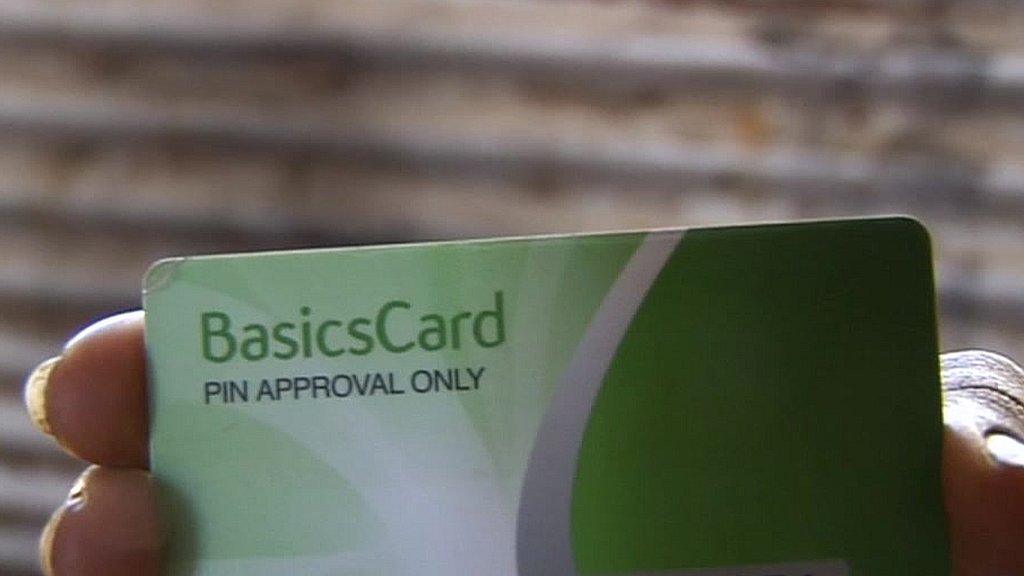The human cost of Australia's illegal 'robo' hunt for welfare cheats
- Published

Jarrad Madgwick's family say he felt immense financial pressure
At the beginning of Australia's winter last year, Kath Madgwick read the last message she'd received from her only child.
"I love you mum," her son Jarrad, 22, had texted.
Her son had made her extremely proud, wrote Ms Madgwick in a letter later read out to a parliamentary inquiry. A former school captain, and state-ranked swimmer, Jarrad had been a respectful young man, kind and helpful to others.
But in the year before his death, he had fallen on hard times. There had been a relationship break-up and bullying at work. Newly unemployed and struggling with his mental health, he moved back in with his mum.
He applied to join the army around the same time he applied for unemployment benefit.
When his claim was rejected, he was devastated. On the day of his suicide, he rang up Australia's welfare office to ask why.
"Um hello. I'm like in a pretty desperate situation here," he told the Centrelink officer.
"I've waited a month and I've jumped through all the hoops and I'm just wondering why I haven't even had an explanation? We can't afford rent and I'm thinking about stealing food… like, we need this money," he said.
After that call, Ms Madgwick says, Jarrad checked his welfare account. That was when he learnt that he owed A$2,000 (£1,100; $1,500) to the government. The debt was an apparent overpayment of a previous student benefit he had received - and this had barred his new claim.
"From then on, he was just distressed and inconsolable. But he was still desperately trying for jobs right up until the moment he left the house," Ms Madgwick told the BBC.

Kath Madgwick with her son Jarrad
Later, it would emerge that Jarrad was one of more than half a million Australians caught up in the nation's so-called "Robodebt" scandal, which ran from 2016 to 2019.
This welfare policy, later ruled to be illegal, forced some of the county's poorest to pay off debts, many of which never existed in the first place. The government sent letters, often repeatedly, to citizens demanding they refund the "overpayments".
For those that could afford it, they withdrew savings or started repayment plans to pay off what was often thousands of dollars. For others, the financial shock came at the worst point in their lives.
Jarrad's mother contends that his debt was one of those that were miscalculated, but he did not live long enough to find this out. He died on 30 May 2019, taking his life in what his mother says was an impulsive act.
Ms Madgwick holds the government partly responsible for Jarrad's suicide.
"He just got himself worked up in those two hours over this proposed debt thinking that he wasn't going to get any Centrelink. He was desperate," she said.
'Vilifying the poor'
Robodebt, officially known as the Online Compliance Intervention scheme, was introduced in 2015 by the conservative government, with the aim of saving A$1.7bn.
At the time, Minister for Human Services Alan Tudge said people were cheating the welfare system. "We'll find you, we'll track you down, you will have to pay those debts and you may end up in prison," he said.
But critics said the system was "a kind of criminalisation of those on welfare", part of a wider attempt by Australia's conservative government, prior to the pandemic, to slash the welfare net. The government was also criticised for upping requirements making it harder to receive a payment, controlling how recipients spend their money, and for proposals such as mandatory drug-testing of jobseekers.
Robodebt was just another policy vilifying the poor and vulnerable, this time through the use of technology, said social policy professor Ruth Phillips from the University of Sydney.

The need for welfare this year has spiked due to the pandemic
She notes it was part of a global trend of governments using tech to tighten their welfare systems. In India, the poor have to scan their fingerprints for food stamps. In the US, some states use a similar computer which trawls through decades of data to reclaim payments.
"It's all about the idea that we're surveilling you, and making sure you don't get overpaid your due," she told the BBC. "It's a terrible contradiction to the purpose of the welfare state [in Australia], which is actually to ensure that people have sufficient resources to survive in what is really a very wealthy country."
'I knew I was innocent'
Robodebt replaced a previous system where bureaucrats had hand-checked records before contacting recipients. In Australia's means-based welfare system, people who receive a benefit typically have to report their income every two weeks. Robodebt matched those submissions with tax office data to find discrepancies.
Within the first year of its use, it found 10 times more instances of "cheating".
However, the vast majority of these cases were people who had done nothing wrong. Rather, the algorithm had relied on flawed maths: averaging the fortnightly income of a recipient.
But this simply did not work for people whose pay slips differed from week to week, like students working irregular shifts.
It was these people who were now accused of owing debt - and the onus was on them to prove that they had done nothing wrong.
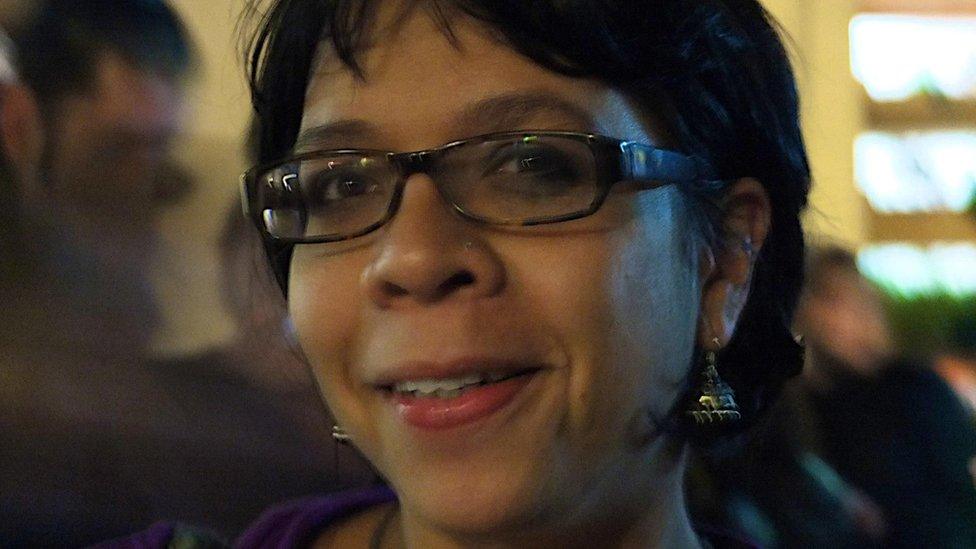
Katherine Prygodicz had briefly received an unemployment benefit before finding her teaching job
School teacher Katherine Prygodicz, 43, had been at first puzzled by the night-time phone calls she began receiving in January 2019. When they asked for her bank details and personal information, she thought it was a scam.
Only months later, when her entire tax return was confiscated, did she realise she owed money to the government. Other stories have been reported of people going to the shops and discovering their bank accounts drained, external, as part of the debt collecting.
"I couldn't understand why I had a debt," Ms Prygodicz told the BBC. "I'm a maths and science teacher. So I couldn't understand how I could have reported the numbers wrong because that's what my thing is.
"What upset me was that they were implying that I hadn't reported my income properly - that I was committing welfare fraud. But I knew I was innocent."
She began challenging the claim, but encountered stigma around her fight. Most of her family were supportive. "But some thought that I must have done something wrong, or that if it was a government misunderstanding, it could be easily cleared up."
'Exonerated'
Ms Prygodicz faced a battle that has been shared by thousands of other Australians.
In late 2016, people began reporting complaints to their local MPs and media, leading to wider scrutiny. There have been ombudsman reports, legal analysis, court challenges and two parliamentary inquiries which heard from families who said Robodebt was a factor in their loved ones' deaths.
Throughout it all, the government staunchly defended the programme's legality. Bureaucrats expressed sympathy for families like the Madgwicks, but refused to say whether they accepted that Robodebt had been a suicidal pressure.
Then in November last year, a few months after Jarrad Madgwick died, the Federal Court of Australia ruled it was illegal.
Six months later, affected recipients were told by the government they were part of a court case suing the state - believed to be the largest class action in Australia.

You may also be interested in:
Australia bank inquiry: 'They didn't care who they hurt'

Days later the government abolished Robodebt, and announced it would refund more than A$721m of paid debts to everyone who had paid up.
The class action was settled on Monday, with the government agreeing to pay A$1.2bn. This sum includes A$112m in compensation, and dropping A$379m in fake debts challenged by people like Ms Prygodciz.
"I feel exonerated, even though I didn't do anything wrong," she told the BBC.
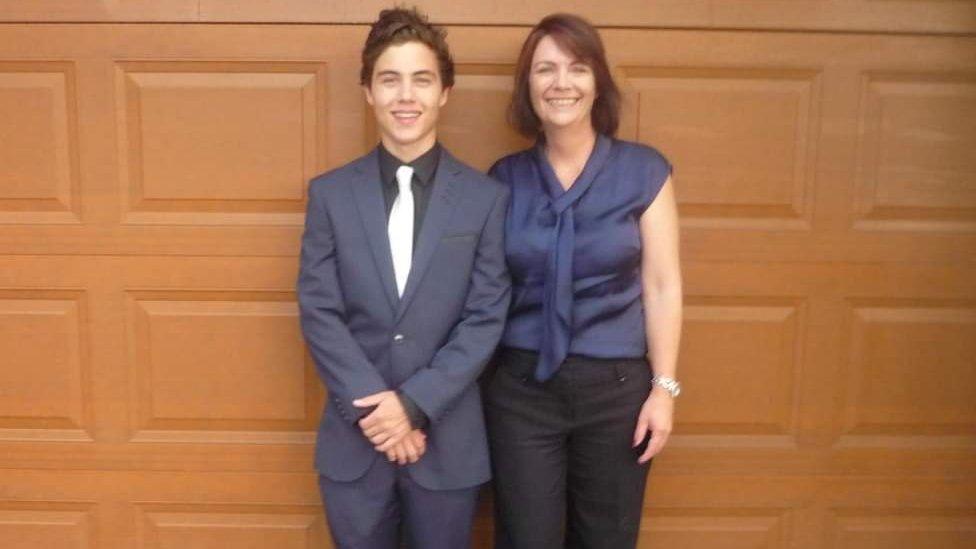
Jarrad Madgwick and Kath Madgwick
But the government has refused to admitted liability as part of case's settlement. And many are still calling for proper accountability. The government imposed a system - that was not only illegal - but targeted the most vulnerable and poor, and caused widescale suffering and hardship.
"You're dealing with people that are down on their luck and already not feeling good because they've got to go to the government to get help. It's not right to be using an automated system to go after them," said Ms Madgwick.
Australia's Labor and Greens political opposition are leading calls for a royal commission - the top form of public inquiry - to determine who was responsible for what they described as a "government scam", arguing they knew about the system's problems before it was ruled illegal.
Ms Madgwick also wants someone held accountable. In June, Prime Minister Scott Morrison said he "would apologise for any hurt or harm" caused by the scheme. But Ms Madgwick says this isn't a true apology, and notes no government figures have lost their jobs.
"Why didn't the government treat people like they're people?" she asked the BBC. "He hasn't acknowledged the damage that this system has caused to so many Australians, not just myself.
"There was no empathy in this scheme, this was just about the dollar for them."
If you are feeling emotionally distressed and would like details of organisations in the UK which offer advice and support, go to bbc.co.uk/actionline.
If you are in Australia, you can call Lifeline at 131114, Kids Helpline at 1800 55 18000 or visit the Beyond Blue website., external
- Published22 August 2017
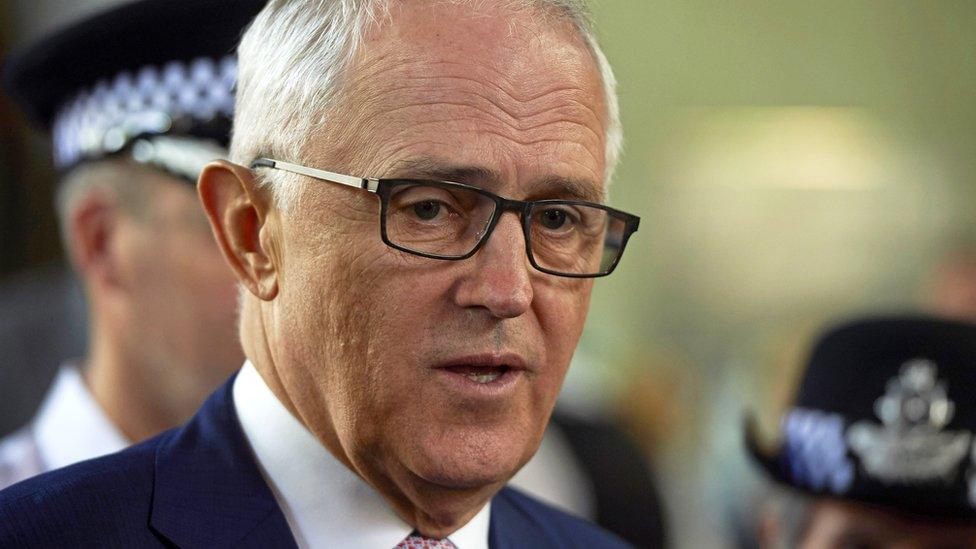
- Published25 February 2015
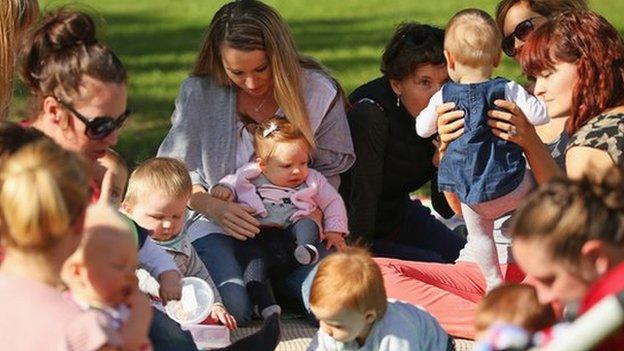
- Published20 August 2012
